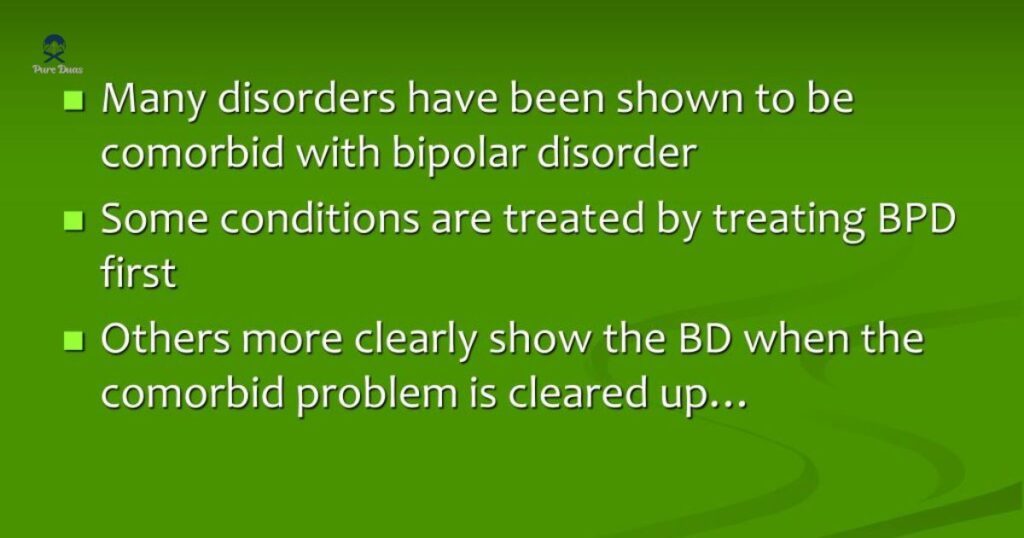Life with bipolar disorder may be unpredictable and difficult since it may influence mood, energy, and routine. Knowing how to live with bipolar disorder will enable you to deal with symptoms, establish stability, and re-establishing control of your life. By using appropriate coaching, you may devise coping mechanisms to deal with daily life of the bipolar disorder and enhance emotional health.
Mental health awareness implies awareness of the significance of mental health, knowledge of such conditions as bipolar disorder, and self-care and treatment. Education enables individuals to decrease stigma, get resources and engage in coping mechanisms towards bipolar disorder. Consciousness also gives people the strength to overcome obstacles as they focus on living a successful life with bipolar disorder.
This guide explains practical ways to live with bipolar disorder, including how to identify symptoms, understand the differences between bipolar 1 and 2, and create daily routines. We shall also touch on relationships, emotional support, therapy, medication, and how to achieve joy with bipolar disorder. By reading on, you will also get applications in stability, self-acceptance and success despite mood swings.
Difficulty of living with Bipolar Disorder
It can be very difficult to live with bipolar disorder since it has an impact on the personal and professional life of a person due to mood swings. Learning about the symptoms of bipolar disorder and the triggers can also assist you in the development of strategies to cope with bipolar disorder. In an attempt to keep mental awareness, many people find it hard to cope with daily activities, emotional stability as well as relationships.
The challenges of living with bipolar disorder are different and depend on the extent of the depressive and manic episodes. Through identifying the causes of bipolar disorders and administering therapy, medication and self care, people can mitigate the effects of the mood swings. Understanding the daily challenges of bipolar disorder helps you plan and offer emotional support to improve overall well-being.
Bipolar 1 vs. Bipolar 2
In the former scenario, bipolar 1 encompasses stronger manic episodes whereas bipolar 2 encompasses lower extremes of depression and hypomania. The information about the distinction of the kinds of bipolarity is helpful in the accurate diagnosis and effective treatment of bipolar disorder. The knowledge of these differences will help individuals to manage the symptoms and live normally.
Bipolar disorder of either of the kinds requires that depressive episodes of bipolar disorder are observed and hypomania or mania are observed. One of the options to reduce the stigma and enhance mental health awareness is to provide education regarding bipolar disorder diagnosis and treatment options. The awareness of the differences also comes in handy during self-care and the emotional regulation processes.
Can one live a normal life when having Bipolar Disorder?

Yes, many of us live a full and productive life with bipolar disorder using drugs, treatment and support groups. Using coping techniques to cope with bipolar disorder is one way to become more balanced emotionally and reduce the intensity of mood swings. With the knowledge and commitment, one will be able to pursue careers, relationships and ambition in their personal life.
Mood swings need to be controlled and a healthy routine should be taken to be able to lead a normal life. The use of mindfulness, self-care and support systems makes the daily life with bipolar disorder appear more balanced and managing. During planning and acceptance, it is possible to survive despite difficulties.
Coexisting with a Bipolar Disorder
Being a loved one of a bipolar disorder sufferer means being patient, empathetic and understanding of the problems of bipolar disorder and mood swings. Being a supporter of a loved one means learning coping skills on dealing with bipolar disorder and understanding how mood swings work in a relationship. Awareness assists the two partners to overcome conflict and emotional ups and downs.
Boundaries, communication and involvement in therapy will promote a healthier relationship as one continues to live with a bipolar spouse or family member. Learning supporting a bipolar loved one strategy enhances resilience and emotional stability of both parties and also minimizes stress.
It is not to remember Bipolar Disorder Is a Real Illness
Bipolar disorder is a valid mental disorder that is brought about by chemical imbalances, genetics and environmental factors. Acknowledging what bipolar disorder is legitimizes experiences and stimulates the idea of seeking care regarding the bipolar disorder symptoms. Awareness is a counter to stigma and encourages mental health education to both the patient and loved ones.
Acknowledging that bipolar disorder is an actual disease will enable the patients to participate in the therapy, administer medicine, and practice self-care. Mental health awareness and the gravity of the condition will make people not feel ashamed of requiring assistance or support.
Learn about Bipolar Disorder
Knowing about bipolar disorder will enable you to cope with the problems of bipolar disorder and provide support to loved ones. Learning about the causes of bipolar disorders, symptoms, and treatment choices can make you predict mood fluctuations and organize everyday life with bipolar disorders. Education eliminates fear and promotes more effective coping mechanisms.
Education also leads to increased awareness about mental disorders and empathy to those who are going through the daily life of bipolar disorder. Informing yourself will help you to notice the signs at an early stage, promote therapy compliance, and create a positive environment either at home or at work.
Dealing with Bipolar Disorder in a Relationship
The process of managing the bipolar disorder relationship entails patience, understanding and open communication. Being aware of relationship problems with bipolar disorder enables partners to overcome mood swings without confrontation. Holding expectancy and speaking about triggers encourages emotional safety of the partners.
Supporting a loved one involves emotional learning in support of bipolar partner strategies and also practicing empathy during manic or depressive episodes. Knowledge on coping skills toward bipolar disorder enhances trust and closeness as well as minimizing the stress in everyday life.
Living with a Bipolar Spouse

Life with a bipolar spouse requires one to make sense of the instability of bipolar disorder day by day. The positive aspects of planning routines, talking freely about emotions, and devising ways to cope with difficult times are beneficial to the couples. In this way, stability and respect are guaranteed in the relationship.
Balancing will involve both partners to understand how to deal with mood swings and be patient when they occur. Promoting therapy, medication compliance, and emotional encouragement will provide a healthier environment, and support of a bipolar loved one.
When Your Bipolar Spouse is Suffering
It is important to be empathetic and avoid being judgmental when a spouse who is bipolar is struggling. Learning about bipolar disorder issues can enable the partners to react in a composed manner during manic episodes or a depressive episode. The relationship is enhanced by active listening and reassurance.
Some practical steps can be to promote professional assistance, day-to-day living with bipolar disorder and open communication of feelings. Helping your spouse and preserving your own mental health enhances stability in the long-term and relationship problems with bipolar disorder.
How to Live a Happy Life with Bipolar Disorder
Hobbies, communication with individuals one loves, and showing gratitude help live a happy life with bipolar disorder. Knowing what living with bipolar disorder is like will be a jump to prevent the highs and lows of your mood to have a good life.
Bipolar Disorder Living A Christian Life
Mental health practices in combination with bipolar disorder and faith and prayer make the life of a Christian with a mental problem a mixture. Having faith in God and exercising faith and mental health integration invoke emotional package and spiritual comfort. Coping mechanisms can be informed by the bible and minimization of anxiety can be achieved.
The hope that can be gained by Christian people is seeking the joy of having a bipolar disorder by means of prayer, support of the church and fellowship. There is no substitute for therapy like spiritual practices, and so a balance between living with bipolar disorder and taking medications and mindfulness is achieved.
Suggestions on how to live a happy life with bipolar disorder

Sources of happiness with bipolar conditions are acceptance, self care and establishment of support networks. Learning the coping mechanism of bipolar disorder will help such individuals to live a good life despite their emotional problems. With mental wellness made one of the priorities, there would be peace and long-term stability.
Daily activities, positive coping and therapy are effective in maintaining happiness as individuals cope and live with bipolar disorder. Acknowledgment of triggers, self-reflection, and acceptance of personal achievements increase self-confidence and bring about a sense of living with bipolar disorder everyday life satisfaction.
Conclusion
Bipolar disorder is a very challenging condition to endure but it is not an insurmountable problem. Being aware of the signs of bipolar disorder, how to manage the mood-swings, and the significance of mental health awareness, the methods, which will help to find the balance, tranquility, and optimism, will be found. Regularities, treatment, drugs and support of loved ones enables the normal way of life and inspires emotional fortitude.
Through self-care, faith and positive coping behaviors, people are able to overcome adversities. The coping strategies of bipolar disorder, relationship empathy and appreciation of the small things are useful in remaining happy and finding meaning. We can live a happy life with bipolar disorder in our day-to-day life by being patient, understanding, and determined and it proves that mental illness does not dictate to us what we can achieve.
Frequently Asked Questions
What is bipolar and what effect does it have on day to day life?
The bipolar disorder is a mood disorder or a mood low and high with an effect on energy, attention, job relations with others and day to day functioning. Being aware is helpful in living life.
Is bipolar disorder a curable disorder that would result in normal life?
Yes, with treatment, medication, and support, individuals were able to lead a normal life in spite of their bipolar disorder and carry on with their lives and even to formulate relationships and even personal goals.
How do I assist a bipolar loved one?
Studies regarding bipolar disorder, be frank, show empathy and encourage therapy. Good relationships increase coping and reduce stress.
How is the difference between Bipolar 1 and Bipolar 2?
This is the distinction between Bipolar 1 and Bipolar 2; the severity of mania and hypomania. The knowledge of the symptoms can help in the treatment and emotional stability management.
But what about being happy with having bipolar disorder?
In order to live a happy life, cope with bipolar disorder, be mindful, maintain routines, seek support, and to practice joy and personal development.
Read More Blogs:Pure Duas
